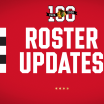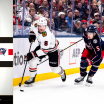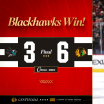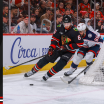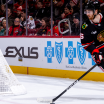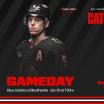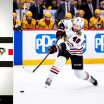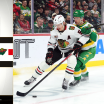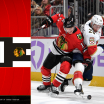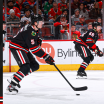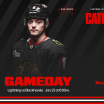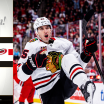Collin Delia might look as comfortable in front of a university chalkboard giving lectures on the psychology of athletes as he does between the pipes during a hockey game.
His eloquence and intelligence were on full display during a conversation in early April just inside the Zamboni entrance of the BMO Harris Bank Center in Rockford, IL. The Chicago Blackhawks goalie prospect opened up regarding several topics in relation to his development, in which he places a great deal of emphasis on the mental side of the game.
The goaltender has come a long way in the past year thanks in large part to his devotion to reaching a certain level of "enlightenment."
FEATURE: Collin Delia is 'stacking paper' in search of his next level
The Blackhawks goaltender discusses the mental side of development and his attempts to close the gap between present and future success
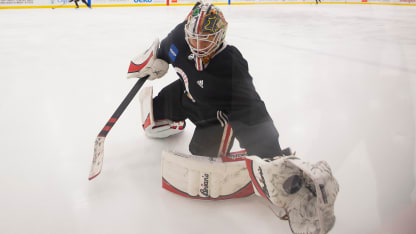
By
Chris Wescott
NewJerseyDevils.com
2018-19 was without a doubt a successful growth season for Delia, who split time between the Blackhawks and the Rockford IceHogs of the American Hockey League. His impressive play during a stretch of NHL action helped Delia earn a three-year, $3 million extension with the club. But this is really only the beginning of his journey.
"I think [this season was] both challenging and educational," said Delia. "I'm working towards something greater than what is [here in the AHL]. Obviously, it's a great opportunity to develop here but I want to become a complete player and not to say you're done developing once you leave here but you take on a different mindset in a way. I think when you're in the NHL full-time you have a certain standard of operation for yourself. I think for me it's just iterative process, finding what's going to work and what's not going to work and refining what it is I want to bring to the next level and be consistent with."
Delia's path to finding that desired consistency begins between the ears.
For Delia, year two was a different development story than year one. Finding a more steady and sustainable path forward is key to him reaching his full potential.
"It's so hard not to compare the progression to last year because coming from where I was in the ECHL and then getting called up to the NHL, that was a huge, exponential growth process for me," he said. "For this year it's been a different trend, so to speak. It's been up, it's plateaued, it's been up, it's been gradual. Especially right now, I feel like I still have a little more to give."
The 24-year-old netminder finished his 2018-19 NHL season 7-5-3 with a .906 save percentage but there were stretches of games in which he flashed brilliance. Take Dec. 21-Jan. 7 for example, in which Delia posted a .947 save percentage in five starts.
Delia is now on a journey to raise his floor so that there is a baseline level of performance for him night in and night out. Raise the floor and the ceiling must follow.
It all begins with stacking paper - and no that is not a reference to the money in his new contract.
Dave Marks, a Mental Skills Coach with a masters in clinical psychology who works with amateur and professional athletes to help them enhance their performance and preparation techniques, helped Delia create a symbolic image of his development journey.
"Every day you have to meet that standard you set the day before," Delia explained. "If you want to raise that standard a little bit, you can't raise it a whole lot every day. You can incrementally do it. I think about it as stacking sheets of paper up. Each day you stack a sheet of paper on top of another and, eventually, 30 days later you'll have an inch stack. A couple of months later it's a pretty big stack. I look at it like that, but at least every day I want to meet the standard I set the day before. If I had raised the standard the day previous I want to work back to that standard before I can try to raise the bar again. That's my mindset here moving forward. Moving into the summer when we're training and whatnot and getting ready for next year, that's going to be the same mentality I have. It's about continuing to push myself and see progress."
As Delia's stack gets higher so does the pressure to maintain that level of play. And so as Delia looks ahead to the next several months, his first step isn't to hit the gym or the ice, it's to get far away from the game of hockey for a time.
"The [hockey] environment, you're in it every single day," he said. "The pressures you put on yourself, that other people put on you, the way you need to channel that is [a lot]. To get away from it and to not think about it is also healthy. It's extremely healthy to find progress in other areas of your life. We're not just hockey players like other people think. We do have lives, we have families outside the game and it's important to recharge those relationships and those bonds. For me, the first step is disassociating myself, take some time, turn my phone off and get away from everything."
After he's taken the time to clear his mind he'll get back on the ice right? Not quite yet.
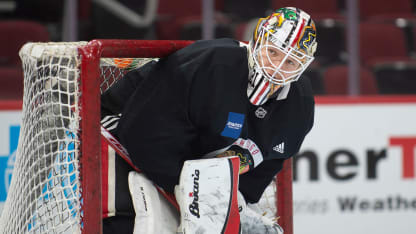
"I like to start by doing a lot of foundational work in the summer," he said. "I think that is more with mental skills. That's a huge area of emphasis for me moving forward. Next year, I want to be the number two and push to be the number one. What's it going to take mentally for me to put myself in that headspace? In the summer, when I'm practicing, I am going to visualize that. I am going to be taking visual, mental reps of games. If we're winning 3-0 with a minute left, what's the mindset going to be. Or vice-versa, if we're down 3-0 or it's 2-1, how are you going to prepare for those moments and perform in those moments?"
Visualization is not an unheard of tactic in the world of sports. It's actually quite common practice with Olympic athletes. It's a way of mentally rehearsing your craft to such a point that success turns from thought to reality.
In Delia's case, he is attempting to use visualization techniques to close his development gap and shorten the timeframe between what he is now and what he will become years from now. Marks has helped him quite a bit, but Delia also uses his own mediation applications and techniques to help him with this.
"It's just about putting your energy into one principle and focusing on that," Delia said. "The one good thing that Marks has said is think about what type of goalie you're going to be in five years. What would that goalie in five years tell you now? Then you can kind of close that developmental gap in a way. You take the power of being as good as you want to be in five years and apply that knowledge and that experience to who you are in this moment. In a way, that learning curve becomes shortened. In a sense, that five-year goalie becomes the two-year goalie and then the two-year becomes right now."
Delia's plan isn't the same for other players. Development isn't a uniform process. Corey Crawford, for example, is at a completely different point in his career. The Blackhawks number one goaltender has already reached a certain level of play, success and consistency. His paper is stacked.
"I think his process is different from my perspective," said Delia. "I think he's a guy who is so free at all moments. The things that would normally affect certain goalies, he doesn't even process them. He's just on a completely different level of enlightenment so to speak. He just goes out there, straps his pads on and plays and competes. He doesn't let the nuance enshroud him while a lot of other guys might be bogged down by that. I think for me, seeing that as a younger guy and having a little of that aspect myself, it's something I can channel a little bit of that energy into my game."
Seeing Crawford unfazed by the ups and downs of a game and observing how he navigates those rocky waters is something Delia carries with him into the offseason. It's something he can visualize in his own game.
"That's the biggest thing you take away from professionals like him," said Delia. "It's not so much what they say, it's what they don't say. It's their actions, the way they carry themselves and there's a lot of good in his game I think I can take and make my own. Obviously, he's his own person. You can find inspiration in anybody, and you have to make it your own. You have to see it in a way that works for you."
After a period of visualization this summer, Delia will begin to get the physical aspects of his training underway, all while keeping the mental side of the game top of mind.
"For me, after taking some time off, I'll revisit the basics," he said. "I'll start with that foundation, get my body right and feeling ready, and then I can start to build. I can build that framework of being an NHL goalie, being consistent and reliable, being great in practice, great in games, being a good teammate, those are all crucial."
If Delia continues stacking that paper day in and day out, who knows how high he'll go?

